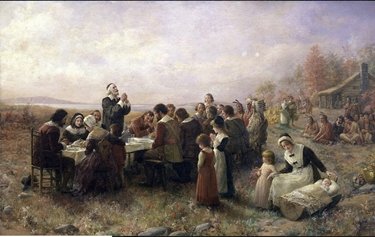
Mike Franc, at Human Events in 2005, identified the real reason for celebration at the first Thanksgiving.
Writing in his diary of the dire economic straits and self-destructive behavior that consumed his fellow Puritans shortly after their arrival, Governor William Bradford painted a picture of destitute settlers selling their clothes and bed coverings for food while others “became servants to the Indians,” cutting wood and fetching water in exchange for “a capful of corn.” The most desperate among them starved, with Bradford recounting how one settler, in gathering shellfish along the shore, “was so weak– he stuck fast in the mud and was found dead in the place.”
The colony’s leaders identified the source of their problem as a particularly vile form of what Bradford called “communism.’ Property in Plymouth Colony, he observed, was communally owned and cultivated. This system (“taking away of property and bringing [it] into a commonwealth’) bred “confusion and discontent” and “retarded much employment that would have been to [the settlers’] benefit and comfort.”
Just how did the Pilgrims solve the problem of famine? In addition to receiving help from the local Indians in farming, they decided allow the private ownership of individual plots of land.
On the brink of extermination, the Colony’s leaders changed course and allotted a parcel of land to each settler, hoping the private ownership of farmland would encourage self-sufficiency and lead to the cultivation of more corn and other foodstuffs.
As Adam Smith would have predicted, this new system worked famously. “This had very good success,” Bradford reported, ‘for it made all hands very industrious.” In fact, “much more corn was planted than otherwise would have been” and productivity increased. “Women,” for example, “went willingly into the field, and took their little ones with them to set corn.”
The famine that nearly wiped out the Pilgrims in 1623 gave way to a period of agricultural abundance that enabled the Massachusetts settlers to set down permanent roots in the New World, prosper, and play an indispensable role in the ultimate success of the American experiment.
A profoundly religious man, Bradford saw the hand of God in the Pilgrims’ economic recovery. Their success, he observed, “may well evince the vanity of that conceit–that the taking away of property– would make [men] happy and flourishing; as if they were wiser than God.’ Bradford surmised, ‘God in his wisdom saw another course fitter for them.”
The real story of Thanksgiving is the triumph of capitalism and individualism over collectivism and socialism, which is the summation of the story of America.





